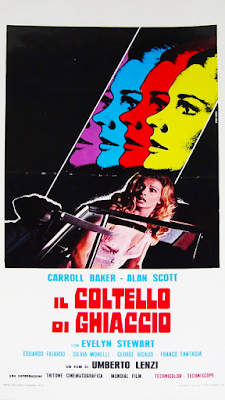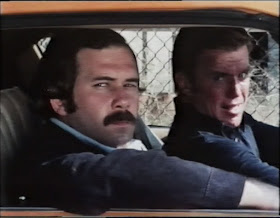YOU SHOULD HAVE LEFT
(US - 2020)
Based on a 2017 novel by German author Daniel Kehlmann, YOU SHOULD HAVE LEFT reunites writer/director David Koepp with star Kevin Bacon, the pair having last collaborated on 1999's acclaimed supernatural thriller STIR OF ECHOES. Bacon once again plays a man tormented by strange, inexplicable occurrences, though instead of a blue collar everyman, he's now Theo Conroy, a wealthy former bank exec who's married to the much younger Susanna (Amanda Seyfried), with a six-year-old daughter named Ella (Avery Essex). Susanna is a moderately successful actress prepping for an eight-week movie shoot in London, so they decide to rent a spacious, modern home in a remote part of the Welsh countryside beforehand as a family getaway. But they have problems that were simmering at home that only proceed to reach a boil when they're stuck in the middle of nowhere. Theo has grown very insecure over their 30-year age difference, about which both Susanna and Ella regularly razz him ("Daddy, will you die before Mommy because you're so much older?"), and though she's only six, Ella is very perceptive and is aware that Theo had a wife before Susanna and that she died under mysterious circumstances that made him a tabloid target ("Why do people hate Daddy so much?" she asks). Theo is also annoyed by Susanna's constant text messages to and from a male colleague, as he's in constant fear that she'll leave him for a younger man. He's working through these jealousies and insecurities and writing in a journal, but the Welsh home only makes things worse. Theo begins to feel disoriented by various things that don't make sense: light switches don't work on the lights they should, doors mysteriously appear where there was once a wall, and a walk down a previously unseen hallway results in a four-hour loss of time. Sensing something is off in the layout, he measures the living room, and finds the interior is five feet longer than the exterior (Ella, holding the tape measure: "How can that be?"). He finds a Polaroid of himself standing in the hallway, a shot that seems to have been taken a minute earlier and left for him to discover. Both he and Susanna start having bad dreams, Ella sees strange shadows on her bedroom wall, and a couple of unfriendly locals seem skittish that they've rented what's known as "the Stetler house." And someone has scribbled "YOU SHOULD HAVE LEFT!" and "NOW IT'S TOO LATE!" in Theo's journal.
In and of themselves, those instances have some creepy and unsettling potential. There's definitely a sense of THE SHINING in this house, especially with its labyrinthine design, its spatial impossibilities (an idea that also prompted House of Leaves author Mark Z. Danielewski to make accusations of plagiarism), a ghostly woman in a bathtub, and the house's effect on the family staying there. But this Blumhouse production tries to meld their patented jump scares with the more cerebral dysfunctional family horrors of HEREDITARY and MIDSOMMAR mastermind Ari Aster, and its pieces never quite come together. It feels padded even at 90 minutes, like a TWILIGHT ZONE episode belaboring its point, with a muddled shrug of a reveal that you'll see coming long before Theo or Susanna do (Koepp makes a huge mistake by telegraphing it in an overtly obvious fashion in the opening scene). Bacon is the solid pro he's always been, and he has terrific father/daughter chemistry with young Essex (Seyfried, for reasons that can't be divulged without significant spoilers, is absent for a long stretch in the middle), but the payoff isn't worth the elaborate buildup. Koepp was one of the hottest screenwriters of the '90s and into the early '00s (APARTMENT ZERO, JURASSIC PARK, CARLITO'S WAY, THE PAPER, MISSION: IMPOSSIBLE, PANIC ROOM, SPIDER-MAN, and he created the acclaimed but little-watched TV series HACK), but to call his more recent work indicative of a slump would be an understatement: in the last few years, he's scripted the dismal likes of INFERNO and THE MUMMY and directed the unwatchable MORTDECAI. YOU SHOULD HAVE LEFT is a step up from those, but it's no STIR OF ECHOES, and Koepp still hasn't regained his mojo relative to his 1990s glory days. Perhaps Universal wasn't feeling it either: this was originally intended to be a summer theatrical release, but once the pandemic hit, YOU SHOULD HAVE LEFT wasn't given a new release date later in the year, nor was it bumped to 2021. Instead, it was among the first major-studio titles to get relegated to the premium VOD route. $2 at Redbox is one thing, but this is definitely not $20 PVOD material. (R, 93 mins)
LEGACY OF LIES
(Ukraine/UK/US - 2020)
Scott Adkins, the hardest-working man in action movies, is back with LEGACY OF LIES, his second movie of 2020, with five more tentatively on the way before the end of the year. This mostly Ukrainian-financed espionage thriller gets too convoluted and sluggish for its own good, but it's anchored by a typically committed Adkins performance and some nicely-done fight scenes, with the star once again collaborating with busy stunt coordinator Tim Man (TRIPLE THREAT). Dutch writer/director Adrian Bol embraces the cliches without shame, with Adkins as Martin Baxter, a PTSD-stricken former MI-6 agent who walked away from the spy game after a botched mission in Kyiv 12 years earlier. Now a single dad to precocious, wise-beyond-her-years Lisa (Honor Kneafsey), Baxter works as a bouncer in a popular London club (cue a packed throng of decadent partiers and throbbing techno beats) and picks up some quick cash in (wait for it) underground MMA fights, but he's in such a slump on that end that Lisa secretly cashes in by betting against him. Baxter's past comes back to haunt him when Sacha (Yuliia Sobol), a crusading Ukrainian journalist and daughter of one of his late former colleagues, comes to him with a story about a dead MI-6 agent and a rat in the network, and something about exposing a Russian plot to develop a deadly nerve gas. He doesn't want anything to do with it, but is forced into action when ruthless Russian agent Tatyana (Anna Butkevich, waiting around for Luc Besson to call her to be the next Sasha Luss) kidnaps Lisa and gives Baxter 24 hours to find Sacha and some top-secret files she has in a safety deposit box in a Kyiv bank.
There's nothing particularly surprising or original here, and a string of false endings only serves to make the film feel like it's loitering for an extra 15 minutes when it could've been sufficiently wrapped up by the 90-minute mark. LEGACY OF LIES is far from essential Adkins, but he's got several not-bad throwdowns that make it required viewing for his fans. The film is torn between being a brutal action flick and a John Le Carre-style espionage downer, and it never quite finds a balance. There's also a backstory involving Baxter's late wife and Lisa discovering the truth behind her death that's never adequately dealt with by the script, and we really could've done without the scene where a depressed Baxter gets caught up in memories of his wife, sitting on the floor turning his bedside lamp on-and-off FATAL ATTRACTION-style. Oh, and at one point, Baxter is told "You just signed your own death warrant!" Yeah, it's that kind of movie. (R, 101 mins)
DEEP BLUE SEA 3
(US - 2020)
A quick glance at the title DEEP BLUE SEA 3 will probably cause most people to wonder "Wait, there was a DEEP BLUE SEA 2?" A DTV sequel coming nearly two decades after a 1999 original that gave us one of the all-time great surprise kills and one of the dumbest closing credits songs ever, DEEP BLUE SEA 2 did the bare minimum to get by, hindered by a low budget and some really shitty CGI, and its story of sharks turning into super-intelligent beings used as experimental subjects in a mad billionaire's Alzheimer's research was beyond absurd. Look no further than the instant classic moment when the bad guy announces his intention to destroy the sharks once he gets all the research info he needs, and he fails to notice an eavesdropping shark either listening or reading his lips. DEEP BLUE SEA 3, which tragically misses the opportunity to call itself D33P BLU3 S3A, sometimes hits those same heights of silliness, and it's a bit of an improvement over its predecessor. Filled with a cast of familiar second-tier TV faces, DEEP BLUE SEA 3 stars Tania Raymonde (of LOST and Lifetime's JODI ARIAS: DIRTY LITTLE SECRET) as shark expert Dr. Emma Collins, who's working with a small research team at Little Happy, a mostly abandoned fishing village on a man-made island in the Mozambique Channel (it was shot in nearby South Africa). Dr. Collins is also a great white whisperer of sorts, unafraid to get up close and personal with one longstanding resident of a great white breeding ground near Little Happy. The team--Collins, her late father's military buddy Shaw (Emerson Brooks of THE LAST SHIP), techie nerd Spin (Alex Bhat), and college intern Miya (Reina Aoi)--have their peaceful existence intruded upon by--conveniently enough--her ex Richard (Nathaniel Buzolic of THE VAMPIRE DIARIES and THE ORIGINALS) and a crew of mercenaries that includes loose cannon Lucas (Bren Foster, another LAST SHIP alum), who are on the hunt for three unusually aggressive bull sharks that killed some residents of a fishing village 100 miles away.
Those three bull sharks tie into DEEP BLUE SEA 2--they're more experimental subjects with human-level intelligence, even understanding Richard's warning of "Back the fuck off!" when one is captured and the other two start attacking the boat. DEEP BLUE SEA 3 is pretty by-the-numbers until it finally embraces its innate stupidity about an hour in, starting with a surprise kill that's actually just as great as the one in the first film (which was honestly one of the best crowd reaction moments I've ever experienced as a moviegoer). Then, it's all-out madness, highlighted by sharks circling a slowly sinking Little Happy as Shaw and Lucas have a spontaneous, full-on choreographed MMA throwdown (Lucas: "C'mon, old man!"); some groan-worthy zingers ("Sorry, chum!"); and an underwater Wilhelm Scream. Writer Dirk Blackman (OUTLANDER, UNDERWORLD: RISE OF THE LYCANS) and director John Pogue (writer of U.S. MARSHALS, THE SKULLS, and GHOST SHIP) understand that these things are basically slasher films with sharks, so they try to make every shark kill the equivalent of the Samuel L. Jackson moment from the original--it works the first time, but the one immediately after is really unnecessarily cruel--and after a draggy start, DEEP BLUE SEA 3 turns surprisingly entertaining, even with PS2-level CGI that seems intentionally cartoonish. Foster's Lucas is a cardboard psycho villain who endangers everyone's lives for no other reason than that's what the script needs him to do. But Raymonde commits herself to this like it's her ticket to the A-list as Collins and lone remaining Little Happy resident Nandi (Avumile Qongqo) eventually find themselves forced to deal with out-of-control, hyper-intelligent sharks and a lunatic Lucas. Not exactly good, but more guiltily enjoyable than it has any reason to be, you can do a lot worse than DEEP BLUE SEA 3 when it comes to cheap DTV shark movies. (R, 100 mins)







































